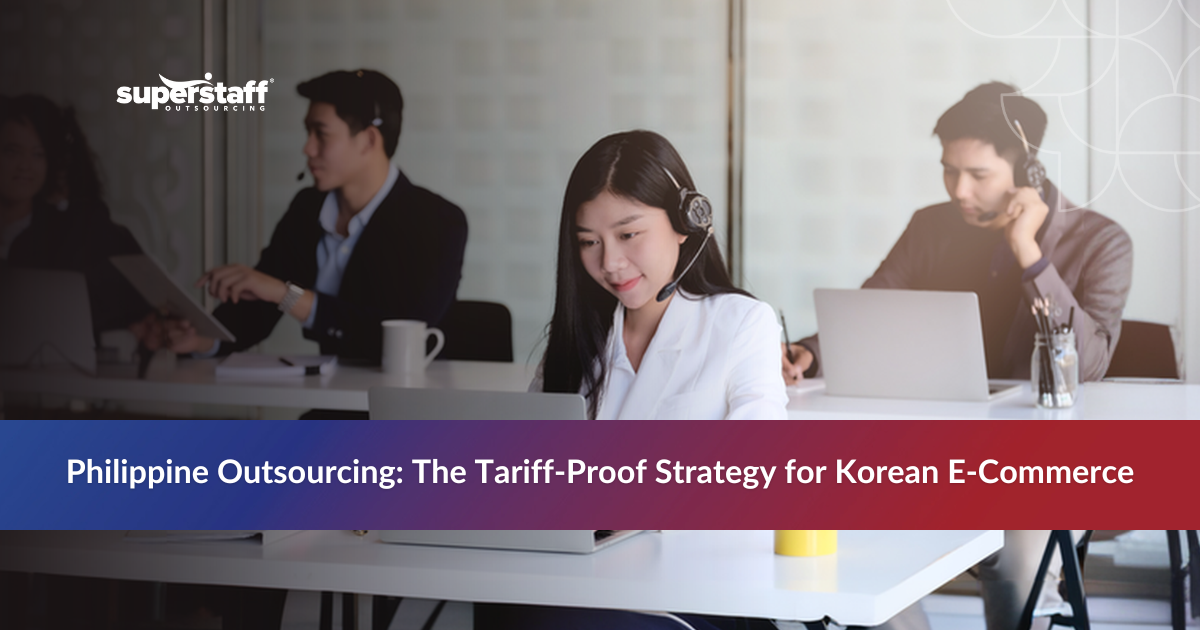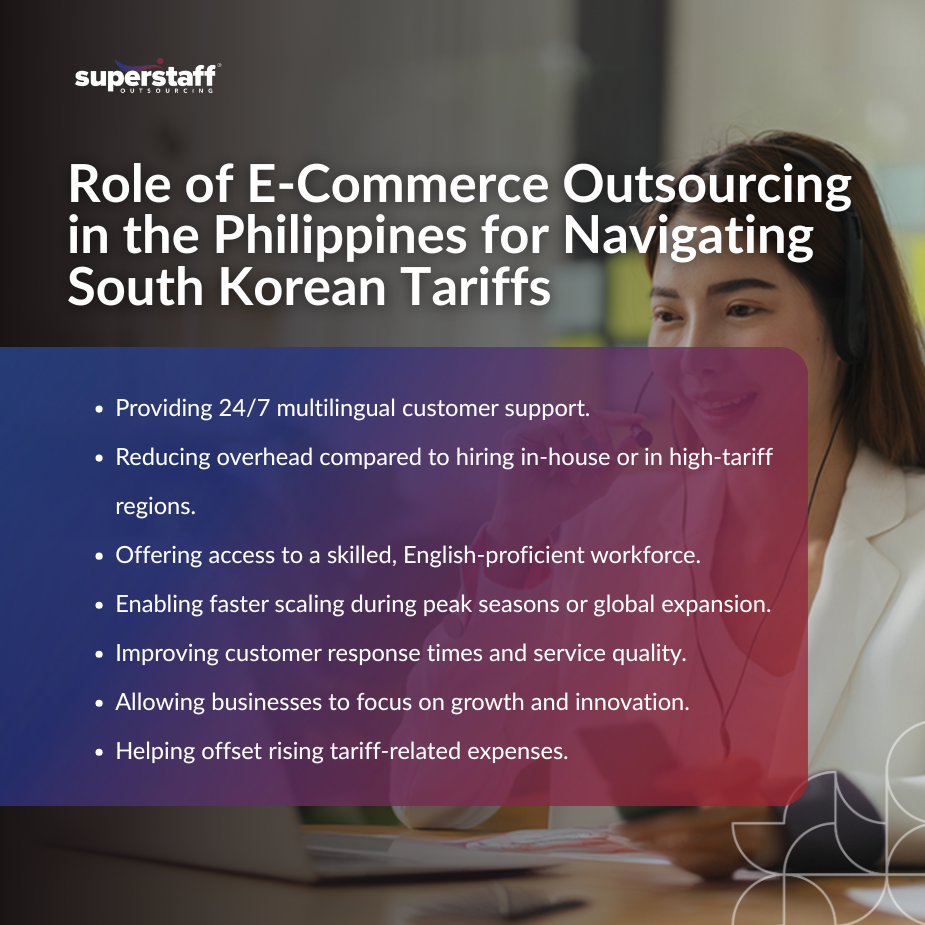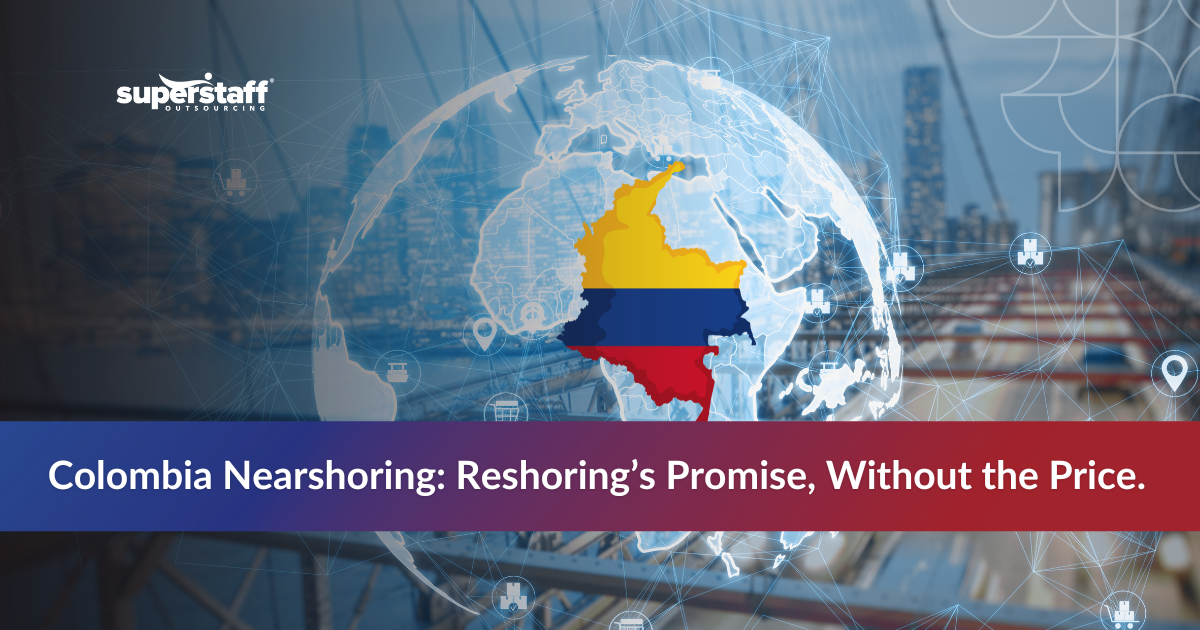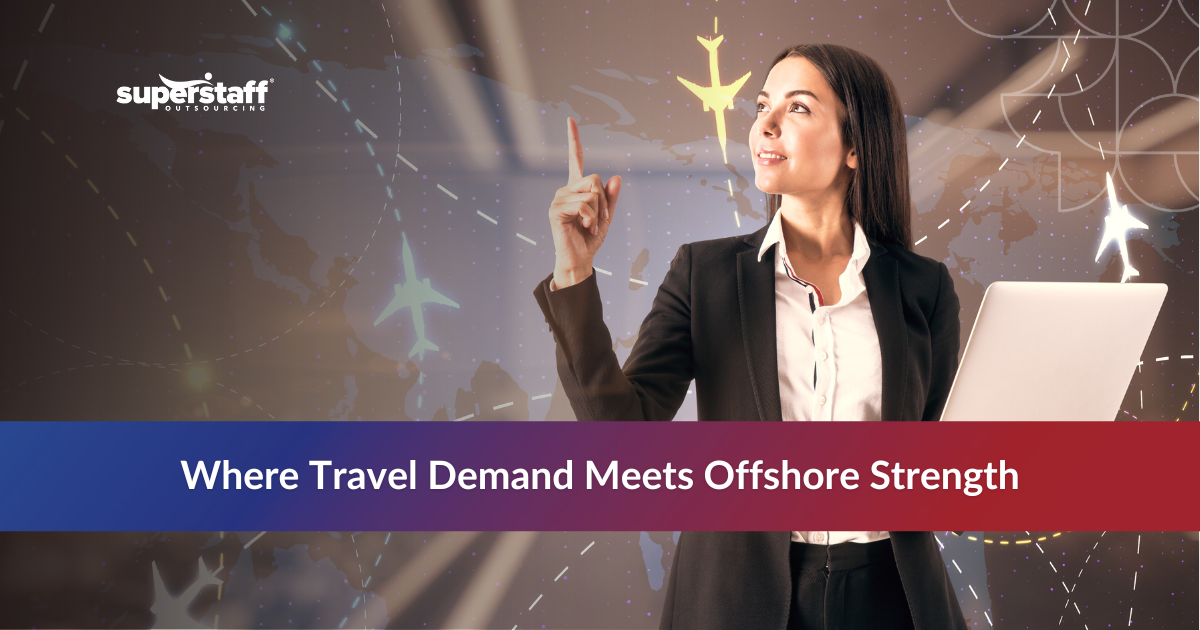
As tariffs rise, South Korean e-commerce companies are looking for smarter ways to stay globally competitive—without passing costs onto customers. The pressure is mounting, especially for brands selling to major markets like the U.S. and EU, where shifting trade policies and higher import duties are squeezing profit margins. Every increase in operational costs makes it harder to maintain competitive pricing, invest in marketing, and scale internationally.
One strategic move gaining traction is ecommerce outsourcing Philippines. With its skilled workforce, cost-efficient operations, and strong cultural alignment with global consumers, the Philippines offers South Korean businesses a way to absorb tariff-related cost pressures without sacrificing service quality or market reach. By offloading critical yet resource-heavy tasks—such as customer support, order processing, and digital marketing—companies can free up capital and focus on innovation and market growth.
This blog explores how ecommerce outsourcing to the Philippines can help South Korean businesses not only weather tariff hikes but also strengthen operational resilience, reduce costs, and seize new opportunities in global trade. The goal: to show decision-makers why the right outsourcing strategy isn’t just a cost-saving measure—it’s a competitive advantage for long-term e-commerce expansion.
Understanding the Tariff Challenge for South Korean Exporters (and the Role of Ecommerce Outsourcing Philippines in Navigating It)
New tariff regulations are creating unexpected obstacles for South Korean e-commerce brands shipping overseas.
Recent years have seen an increase in protectionist trade measures worldwide, and South Korean exporters have not been spared. For e-commerce brands, especially those with a significant share of sales coming from the U.S. and EU markets, these tariffs can make a substantial difference to bottom lines.
- Rising U.S. and EU tariffs on South Korean goods mean exporters are paying more to get products into major markets, reducing already tight profit margins.
- Increased customs duties and paperwork have added not only to costs but also to delivery times—affecting customer satisfaction.
- Higher shipping and warehousing costs due to stricter regulations and logistical bottlenecks make fulfillment more expensive.
- Pressure to maintain competitive pricing despite rising costs forces brands to absorb losses or risk losing market share.
In such an environment, every operational dollar saved can help offset the impact of tariffs. That’s why more brands are looking at outsourcing as a smarter alternative to trimming product quality or hiking prices.
To offset these rising costs, many brands are turning to outsourcing as a smarter alternative.
Why the Philippines Is a Natural Fit for South Korean E-Commerce Brands
The Philippines offers a strategic, cost-effective outsourcing solution for Korean companies looking to protect margins and scale globally.
The country’s business process outsourcing (BPO) sector has been a global leader for over two decades, and it is uniquely positioned to support e-commerce businesses dealing with external market pressures.
- Geographic proximity and strong regional trade ties make the Philippines an ideal partner for South Korea. Time zone overlap allows for real-time communication and operational coordination.
- High English proficiency ensures excellent customer-facing interactions, particularly for companies selling to English-speaking markets like the U.S., U.K., Canada, and Australia.
- Cultural compatibility with both Western and Asian markets allows Filipino teams to adapt easily to diverse customer expectations and brand voices.
- Well-established BPO infrastructure and workforce means South Korean companies can scale their outsourced teams quickly without long setup times.
But what exactly can South Korean companies outsource—and how does it help?

What E-Commerce Functions Can Be Outsourced to the Philippines?
From customer support to backend operations, Philippine outsourcing partners can manage key e-commerce tasks at scale.
Outsourcing is no longer limited to call centers. Modern e-commerce outsourcing to the Philippines includes a range of specialized services that can help South Korean brands optimize operations and improve customer satisfaction.
- Customer service (live chat, email, phone) – Provide around-the-clock assistance in multiple languages, ensuring no inquiry goes unanswered.
- Order processing and fulfillment coordination – Handle transaction verification, shipping updates, and supplier communication.
- Product listing management and content moderation – Keep online store listings accurate, optimized, and compliant with platform rules.
- Social media and customer engagement – Maintain active brand presence, respond to messages, and build loyal online communities.
- Returns processing and issue resolution – Manage refunds, exchanges, and customer complaints efficiently to protect brand reputation.
By leveraging customer support outsourcing Philippines providers, companies can maintain high service standards while reducing staffing costs.
These services not only reduce operational costs—they help businesses respond faster and more effectively to customers.
Cost and Efficiency Gains from Outsourcing to the Philippines
Outsourcing helps South Korean brands protect profit margins while improving customer satisfaction.
One of the most compelling reasons to outsource to the Philippines is the clear financial advantage. Labor costs in the Philippines can be up to 60% lower than in South Korea or other developed economies, allowing businesses to reinvest savings into growth-focused activities.
Key benefits include:
- Labor cost savings of up to 60% compared to maintaining in-house teams in South Korea.
- 24/7 multilingual customer support capabilities, ensuring businesses can handle inquiries from different time zones without overburdening staff.
- Lower overhead costs compared to hiring domestically or in other high-tariff regions where wages and operational expenses are higher.
- Faster scaling during peak seasons or market expansions, thanks to the Philippines’ deep talent pool and established outsourcing industry.
For many brands, outsourcing also enables better focus on growth and innovation.
How Ecommerce Outsourcing Philippines Helps Tariff-Impacted Brands Compete
Real-world examples show how South Korean brands are using outsourcing to stay agile and profitable under tariff pressure.
- A fashion brand outsourcing support to manage U.S. order surges – By shifting seasonal customer inquiries to a Philippine-based team, the company reduced its local staffing needs and improved response times during high-demand periods.
- A beauty product exporter using Filipino agents for returns and refunds – The outsourcing partner handled all reverse logistics communication, enabling the brand to maintain goodwill with international customers while avoiding costly delays.
- A startup using virtual assistants for marketplace management and logistics tracking – The Philippine team updated product listings, coordinated with third-party logistics providers, and ensured on-time delivery, freeing the founders to focus on strategic partnerships.
These scenarios illustrate how Philippine outsourcing helps South Korean companies navigate rising tariffs—not just by cutting costs, but by enhancing service quality and scalability.
If your business is feeling the squeeze, it may be time to ask some key questions.
Is Outsourcing Right for Your E-Commerce Business?
Here’s how to evaluate whether outsourcing is a smart move for your company.
Ask yourself:
- Are tariff-related costs cutting into your profit margins?
- Do you struggle to scale your customer support across time zones?
- Is your team bogged down by operational tasks that could be delegated?
- Are you expanding to new markets that require multilingual support?
If you answered yes to any of these, ecommerce outsourcing Philippines solutions may be the next strategic step for your brand.
The right partner can make all the difference in navigating these challenges.
Ecommerce Outsourcing Philippines: SK’s Secret Weapon Amid Rising Tariffs
E-commerce outsourcing to the Philippines is more than a cost-cutting measure—it’s a forward-looking strategy for South Korean brands navigating global trade challenges.
By choosing to outsource to the Philippines, Korean e-commerce companies can offset rising tariffs, reduce overhead, and enhance customer experience while staying competitive in key global markets.
Leveraging customer support outsourcing Philippines services ensures not only cost efficiency but also operational agility. This approach exemplifies how Philippine outsourcing helps South Korean companies navigate rising tariffs effectively.
Looking to stay agile and profitable despite rising tariffs? Contact SuperStaff to learn how our Philippine-based e-commerce outsourcing solutions can support your global strategy.






